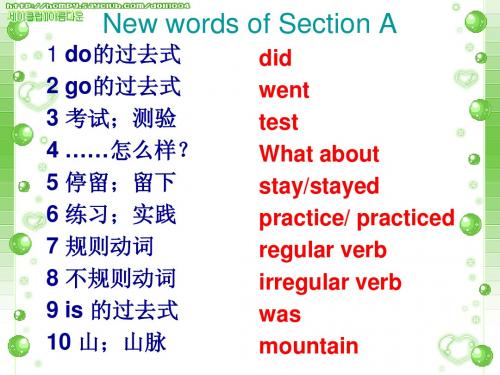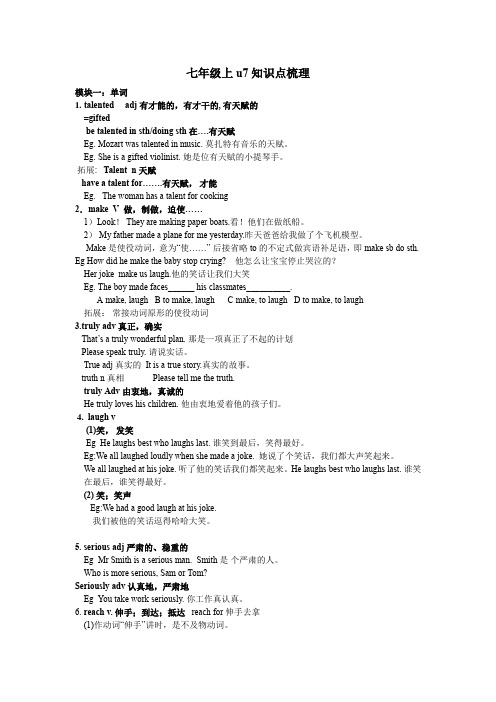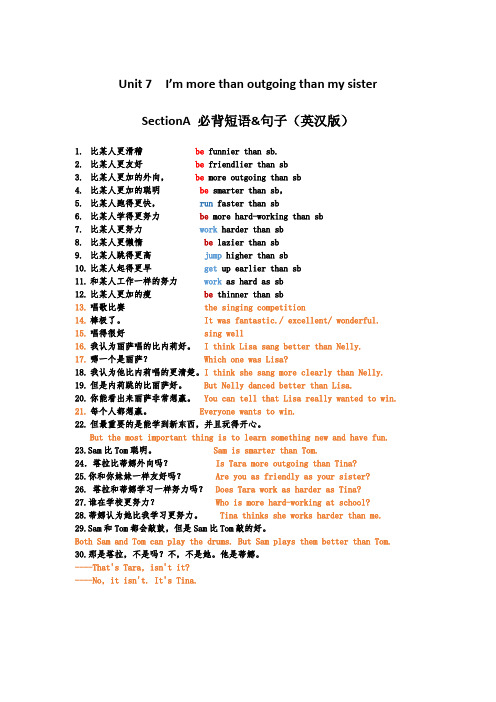U7重要词组和句型、例句
u7 单词短语句子

Translate the sentences of section A
1 你周末过得怎么样?好极了。 你周末过得怎么样?好极了。 How was your weekend? It was great. 2 你在上个周末做什么了?我去海滩了。 你在上个周末做什么了?我去海滩了。 What did you do last weekend? I went to the beach. 3 她在上个周末干什么了?她练习英语了 。 她在上个周末干什么了? What did she do last weekend ? She practiced English. 4 他在上个周末干什么了?他去看电影了 他在上个周末干什么了?他去看电影了。 What did he do last weekend? He went to the movies. 5他们在上个周末干什么了?他们打网球了。 他们在上个周末干什么了? 他们在上个周末干什么了 他们打网球了。 What did they do last weekend? They played tennis. 6 昨天我没有踢足球。 昨天我没有踢足球。 I didn’t play soccer yesterday. 7 在上个周末他们聚会了吗?没有。 在上个周末他们聚会了吗?没有。 Did they have a party yesterday? No, they didn’t.
1 弹吉他 2 学地理 3 去图书馆 4 度过周末 5 在第三中学 6 玩电脑游戏 7 七个小孩 8 访问朋友 9 一个忙碌的周末 10 有点困难 11 给某人做饭
1 played the guitar 2 studied geography 3 went to the library 4 spent the weekends 5 at No. 3 Middle School 6 played computer games 7 seven kids 8 visited friends 9 a busy weekend 10 a little difficult 11 cooked dinner for sb
七年级上册英语苏教版u7知识点

七年级上册英语苏教版u7知识点七年级上册英语苏教版u7共分为三个小节,分别是Unit 7 What do you want?、Unit 8 I'd like some noodles and Unit 9 What would you like?Unit 7 What do you want?1.句型➀:What do you want?(你想要什么?)回答:I want...(我想要...)。
2.句型➁:What would you like?(你想要什么?)回答:I'd like...(我想要...)。
3.句型➂:Can I help you?(我能帮你什么吗?)回答:Yes,please。
I want...(是的,请给我...)。
4.常用词汇:hamburger/sandwich/chicken/noodles/pizza/pasta5.实用日常用语:A: What do you want?(你想要什么?)B: I'd like a hamburger,please。
Thanks.(我想要一个汉堡包,谢谢。
)A: Can I help you?(请问你要点什么?)B: Yes,please。
I want some pizza。
(好的,我想要一些比萨饼。
)Unit 8 I'd like some noodles1.句型➀:I'd like...(我想要...)2.句型➁:What kind of noodles would you like?(你想要什么样的面条?)3.句型➂:Anything else?(还要点别的吗?)回答:No,that's all。
(不要了,就这些。
)4.常用词汇:noodles/rice/noodle soup/vinegar/pork/vegetables5.实用日常用语:A: I'd like some beef noodle soup,please。
七年级上 u7 知识点梳理

七年级上u7知识点梳理模块一:单词1.talented adj有才能的,有才干的,有天赋的=giftedbe talented in sth/doing sth在….有天赋Eg. Mozart was talented in music.莫扎特有音乐的天赋。
Eg.She is a gifted violinist.她是位有天赋的小提琴手。
拓展:Talent n天赋have a talent for…….有天赋,才能Eg.The woman has a talent for cooking2.make V做,制做,迫使……1)Look!They are making paper boats.看!他们在做纸船。
2)My father made a plane for me yesterday.昨天爸爸给我做了个飞机模型。
Make是使役动词,意为“使……”后接省略to的不定式做宾语补足语,即make sb do sth. Eg How did he make the baby stop crying?他怎么让宝宝停止哭泣的?Her joke make us laugh.他的笑话让我们大笑Eg.The boy made faces______his classmates__________.A make,laughB to make,laughC make,to laughD to make,to laugh拓展:常接动词原形的使役动词3.truly adv真正,确实That’s a truly wonderful plan.那是一项真正了不起的计划Please speak truly.请说实话。
True adj真实的It is a true story.真实的故事。
truth n真相Please tell me the truth.truly Adv由衷地,真诚的He truly loves his children.他由衷地爱着他的孩子们。
五上U7知识点

五上Unit 7 At weekends 知识点一、词组1.at weekends 在周末2.play with 和…一起玩3.very much 非常4..go to the cinema 去看电影5.visit my grandparents 拜访我的祖父母6.play with their cat 和他们的猫一起玩7.have dinner with our grandparents和我们的祖父母一起吃晚餐8. live in the UK住在英国9.chat with them 和他们一起聊天10. on the Internet 在网上11.chat on the Internet 在网上聊天12.have dancing lessons 上舞蹈课13.fly a kite 放风筝14.play football with Liu Tao 和刘涛一起踢足球15.have a picnic 野餐16.visit Mr Rose 拜访罗斯先生17.show us 展示给我们看18. all the lovely roses 所有可爱的玫瑰花19. eat a lot 吃许多20. see a butterfly 看见一只蝴蝶21.get out出来e out 出来三、句型1. What do you do at weekends? I often have dinner with my grandparents.你周末做什么?我经常和我的祖父母一起吃晚饭。
2. What do they do at weekends? They usually fly a kite and have a picnic.他们周末做什么?他们通常放风筝和野餐。
3. What does he do at weekends? He sometimes goes to the park.他周末做什么?他有时去公园。
4. What does she do at weekends? She always has dancing lessons.她周末做什么?她总是上舞蹈课。
U7句子结构2022-2023学年牛津译林版八年级英语上册

8AU7语法基本句型一、句子成分句子的成分在英文中句子成分包括:主语、谓语、宾语(直接宾语、间接宾语)、表语、定语和状语、宾语补足语等。
【知识梳理1】主语主语是动作的执行者或发出者。
一般由名词、代词、不定式或相当于名词的词、短语或从句来充当。
一般在句首。
【例题精讲】例1. Lucy is a beautiful nurse. (名词作主语)例2. He reads newspapers every day. (代词作主语)【知识梳理2】谓语说明主语“做什么”,“是什么”或“怎么样”面必须一致。
位于主语后面。
【例题精讲】例1. His parents are teachers. (系动词作谓语)例2. We study hard.(行为动词作谓语)【知识梳理3】宾语宾语是动作、行为的承受者,由名词、代词、不定式或相当于名词的词、短语或从句来担任,它和及物动词一起说明主语做什么。
一般放在谓语之后。
【例题精讲】例1. She is doing her homework now.(名词作宾语)例2. We often help him.(代词作宾语)宾语分直接宾语和间接宾语。
直接宾语是及物动词的直接对象,间接宾语通常是及物动词【知识梳理4】表语表语说明主语“是什么”或者“怎么样”,由名词、形容词、副词、介词短语、不定式及某些分词或从句来担任。
它的位置在系动词后面。
【例题精讲】例1. I am a teacher.(名词作表语)例2. He is always happy.(形容词作表语)【知识梳理5】宾语补足语在宾语后面补充说明宾语的动作、状态、特征的成分,称为宾语补足语。
名词、形容词、副词、介词短语以及动词不定式、分词等可用作宾语补足语。
【例题精讲】例1. We made the charity show a success. (名词作宾补)例2. They make her happy.(形容词作宾补)例3. I see her dance.(省略to的不定式作宾补)【知识梳理6】定语(补充)定语是用来修饰名词或代词的词。
七年级上英语U7必背短语+句子-A

Unit 7 I’m more than outgoing than my sisterSectionA 必背短语&句子(英汉版)1.比某人更滑稽be funnier than sb.2.比某人更友好 be friendlier than sb3.比某人更加的外向, be more outgoing than sb4.比某人更加的聪明be smarter than sb,5.比某人跑得更快,run faster than sb6.比某人学得更努力be more hard-working than sb7.比某人更努力work harder than sb8.比某人更懒惰be lazier than sb9.比某人跳得更高jump higher than sb10.比某人起得更早get up earlier than sb11.和某人工作一样的努力work as hard as sb12.比某人更加的瘦be thinner than sb13.唱歌比赛 the singing competition14.棒极了。
It was fantastic./ excellent/ wonderful.15.唱得很好 sing well16.我认为丽萨唱的比内莉好。
I think Lisa sang better than Nelly.17.哪一个是丽萨?Which one was Lisa?18.我认为他比内莉唱的更清楚。
I think she sang more clearly than Nelly.19.但是内莉跳的比丽萨好。
But Nelly danced better than Lisa.20.你能看出来丽萨非常想赢。
You can tell that Lisa really wanted to win.21.每个人都想赢。
Everyone wants to win.22.但最重要的是能学到新东西,并且玩得开心。
仁爱版八年级下册英语u7t1知识点
仁爱版八年级下册英语u7t1知识点本文将向大家介绍仁爱版八年级下册英语U7T1知识点,包括了主要语法结构、常用单词和短语的用法等内容。
一、主要语法结构1. 直接引语和间接引语直接引语是指直接引用别人的话,一般用引号括起来;间接引语是指将别人的话转述过来,一般不用引号。
例句:直接引语:She said, “I like playing basketball.”间接引语:She said that she liked playing basketball.2. It is + adj. / n. + (for sb.) to do sth.表示“某人做某事是……的”。
例句:It is important for us to protect the environment.3. 不定式的构成及用法不定式的构成为“to + 动词原形”,常用于做宾语、定语和表语。
例句:宾语:I want to learn English.定语:I have a lot of work to do.表语:His dream is to become a doctor.4. 动名词的构成及用法动名词的构成为“动词原形 + -ing”,常用于做主语、宾语和表语。
例句:主语:Swimming is good for our health.宾语:I enjoy reading books.表语:My favorite hobby is playing basketball.二、常用单词和短语的用法1. agree with / toagree with指与某人观点相同;agree to指同意某人的请求或提议。
I agree with you on this matter.He agreed to my plan.2. break upbreak up可以指结束一段关系或分裂、解体等。
例句:They broke up after dating for three years.The meeting was broken up by the disagreement.3. catch upcatch up意为“迎头赶上”,常用于追赶某人或赶上某项工作等。
新目标英语八年级上册Unit7重点词组与句型归纳
新目标英语八年级上册Unit7重点词组与句型归纳新目标英语八年级上册Unit7重点词组与句型归纳Ul奶昔2. turn on 打开 turn off 关turn up 调大,调亮 turn down 调小,调暗3. pour yogublender 把酸奶倒人搅拌机里4. put…into/in...把……放入……内5. 2 tealish 两茶匙调味品6. cut uapples 切碎三个苹果7. add the ingreddles 把这些原料加入面条中8. mix up 混合在一起9. make a banana做香蕉奶昔10. peel the bananas 剥香蕉皮11. How do you make a banana shake ?怎样制作香蕉奶昔12. tublender 启动搅拌机13. Let`s make fruit salad . 咱们制作水果沙拉吧。
14. put in two tea加入两匙蜂蜜15. mix it / them all up 把它(他们)混合在一起16. boil dumplings 煮饺子17. a bag of 一袋……18. a box of 一盒……19. a tea一匙……20. a slice of 一片……21. a cup of 一茶杯22.aa great turkey sandwich巨型火鸡三明治食谱23. I needlp. 我需要帮助。
2u have all the ingredients. 检查有所有的原料。
25. roll the pancake 卷起煎饼。
26. How much yogurt do we need? 需要多少酸奶?27. How many apples do we need? 需要多少苹果?28. First, put the bua slice of bread. 首先,将黄油涂在一片面包上。
29. Tublender for about two minutes. 打开果汁机大约两分钟。
初一英语U7重点短语
初一英语U7重点短语1.沿着街道down the street沿着马路走walk down the road2.去购物go shopping买东西do some/the shopping3.我没有钱I don’t have any money.4.跟我来come with me5.需要你来搬所有的包need you to carry all the bags需要做某事need to do sth需要某物need sth需要某人做某事need sb to do sth需要一些吃的东西need something to eat不需要做某事(两种) don’t/doesn’t need to do sth / needn’t do sth6. 两家鞋店two shoe shops四家体育用品商店four sports shops7.圣诞节就要来了. Christmas is coming.8.买给某人某物(两种) buy sb sth/ buy sth for sb给某人某物(两种) give sb sth/ give sth to sb9.或许他对音乐不感兴趣. Maybe he isn’t interested in music.对做某事感兴趣be interested in doing sth一首音乐 a piece of music10.我知道他喜欢收集邮票. I know he likes collecting stamps.11.不用谢(三种) That’s all right. / That’s OK./ You’re welcome./ Not at all.12.有什么需要帮忙的吗? Can I help you? / What can I do for you?13.稍等片刻(三) just a minute/moment = wait for a moment=wait for a short time14.看一看have/ take a look(at)15.去年的卡片last year’s cards16.各种各样的发卡different kinds of hair clips/ all kinds of hair clips17.发卡与她的粉色外套很称.(两)Hair clips match/ go well with her pink coat.18.找你的零钱. Here is your change.公共汽车来了. Here comes the bus.19. (东西) 贵 cost a lot/ much= cost a lot of money= expensive20.今年的卡片每个两元. This year’s cards are two yuan each.21.Amy有足够的钱买发卡.(两) Amy has enough money for/ to buy hair clips.22.这本书多少钱?(三种) How much does this book cost?How much is this book?What’s the price of this book?23.这些礼物花了Amy20元.(四种) Amy spends 20 yuan on / buying these presents.These presents cost Amy 20 yuan.Amy buys these presents for 20 yuan.Amy pays 20 yuan for these presents.24.我想买一些和Amy不一样的礼物。
八年级英语下册Unit 7重点短语及句型总汇
八年级英语下册Unit 7重点短语及句型总汇Unit7ulduindturningdntheusi?turn…dn/turn…up关小声/调大声音(电器)2turn…n/turn…ff打开/关闭(电器)3vethebie移动自行车4inainute/rightaa/inntie立刻,马上belatefrshl/lass=arrivelatefrshl上学/上迟到6aitinline=standinline排队等候utinline=upaqueue插队8getad/anned变得生气9happentsb发生在…身上halfanhur半小时1atfirst首先2atlast=intheend=finall最后3allsbtd/nttdsth允许某人做/不做某事4bealledtd/nttdsth某人不被允许某人做/不做某事inpubli当众地;公开地;公然地6inpubliplaes在公共场所7breatherule不遵守规则8pi…up捡起9put…ut熄灭20drplitter扔垃圾21eeptheviedn控制声音22dthedishes23 putnantherpairfeansbeataeeting2helpeintheithen26aesepsters27lthingstre28fll…arund29anttbeplite30standinthesubadr31utinline32standlset33 havedifferentideasabut 34feelunfrtableinallsituatins36inpubliplaes本单元目标句型:ulduindleaningtheard?你介意打扫院子吗?2NtatallI’llditrightaa一点也不我马上就扫3ulduindntplaingbaseballhere你介意不要在这打棒球吗?4ulduindgivingeasallerne?Srr,e’llgandplainthepar对不起,我们到公园去打6ulduaedinner?请做晚饭好吗?7That’snprble没问题8ulduntfeedthedg?=ulduindntfeedingthedg?=ulduntfeedt hedg?=Pleasedn’tfeedthedg,illu?请不要喂狗好吗?9Ifufinishthesetass,eangtavietnighturbarbergaveuaterriblehairut1Thestrelergaveutherngsize2Theaitressbrughtutherngfd3Thepenubughtdidn’tr4urderedahaburgerithFrenhfriesbutnlgtahaburgereasedsepeplehatannedtheHere’shatthesaid6Idn’tlieaitinginlinehenashpassistanthasalngtelephnenver satin7Thishappensteallthetieintheshllibrar8PerhapsinthefutureIshuldtrnttbesplite9Theapeplebehaveisdifferentindifferentulturesandsitu atins20Seties,rulesfetiquettearethesaealsteverhere21eightanttassenetbehavereplitelifeseethebreaingarule fetiquette22Etiquetteeansnralandplitesialbehavir23Thisaseelieadiffiultrdatfirst,butitanbeverusefultun derstandInfat,eshuldalstaearenttughrsneezeludlinpubliifpssi ble2Pepledn’tusualllietberitiized,sehavetbearefulhedthis26看到有人抽烟你可以说:uldupleasepututthatigarette?27看到有人乱丢垃圾你可以说:ulduindpiingitup?28看到有人插对你可以说:Srr,ulduindiningtheline?常见动名词、分词的习惯用法总结使用-ing分词的几种情况1在进行时态中。
- 1、下载文档前请自行甄别文档内容的完整性,平台不提供额外的编辑、内容补充、找答案等附加服务。
- 2、"仅部分预览"的文档,不可在线预览部分如存在完整性等问题,可反馈申请退款(可完整预览的文档不适用该条件!)。
- 3、如文档侵犯您的权益,请联系客服反馈,我们会尽快为您处理(人工客服工作时间:9:00-18:30)。
Unit 7
一、重要词组
一个更好的世界__________________ 提供基础教育______________________
平等的权利______________________ 防止疾病扩散______________________
主要在贫困地区__________________ 医疗______________________________
负担不起________________________ 在飞机(船,火车)上______________
给某人做手术____________________ 自豪地做某事______________________
现代医学________________________ 继续开展,继续下去________________
分发传单________________________ 举办一场慈善演出__________________
创建____________________________ 牙疼______________________________
组织其他活动____________________ 防止某人生病______________________
检查一下________________________
不停的问我自己_________________________
下定决心做某事_______________________ 习惯做某事_____________________________
二、重要句型
1、埃迪,慈善组织需要更多的钱。
_____________________________________________________________________
2、我太虚弱了,走不动了。
_____________________________________________________________________
3、这架飞机也被用作培训中心。
_____________________________________________________________________
4、我们的很多病人没有钱去医院看病,所以我们得去他们那儿。
_____________________________________________________________________
5、通过培训他们,我们希望帮助更多的人。
_____________________________________________________________________
6、在我上次巡诊期间,有150个病人做了手术。
_____________________________________________________________________
7、但是需要更多钱了继续我们的工作。
_____________________________________________________________________
8、我牙疼。
_____________________________________________________________________
9、你像这样多长时间了?
_____________________________________________________________________
10、……因此她下定决心接受护士培训,并在下班后去上课。
_____________________________________________________________________
11、她习惯了乘飞机旅行。
_____________________________________________________________________
三、句型
1、我太虚弱了,走不动了。
_____________________________________________________________________
2、你能不能稍微站远一些?
_____________________________________________________________________
3、它为贫困地区的孩子提供基础教育。
_____________________________________________________________________
4、我很高兴你为我们提供了这么多有趣的书。
_____________________________________________________________________
=____________________________________________________________________
5、我们的很多病人没有钱去医院看病,所以我们得去他们那儿。
_____________________________________________________________________
6、我们买得起新车吗?
_____________________________________________________________________
7、我们买不起新房子。
_____________________________________________________________________
8、通过培训他们,我们希望帮助更多的人。
_____________________________________________________________________
9、看看今天的报纸,你就能够对这条消息有更多了解。
_____________________________________________________________________
10、但是需要更多钱了继续我们的工作。
_____________________________________________________________________
11、我不在时请接着干。
_____________________________________________________________________
12、她想帮助有眼疾的穷人重见光明,于是她决定接受护士培训,并在下班后去
上课。
_____________________________________________________________________
_____________________________________________________________________
13、我希望你能尽快做出决定。
_____________________________________________________________________
14、她习惯于乘飞机来往各地。
_____________________________________________________________________
15、起初我觉得这份工作很累人,但现在习惯了。
_____________________________________________________________________
